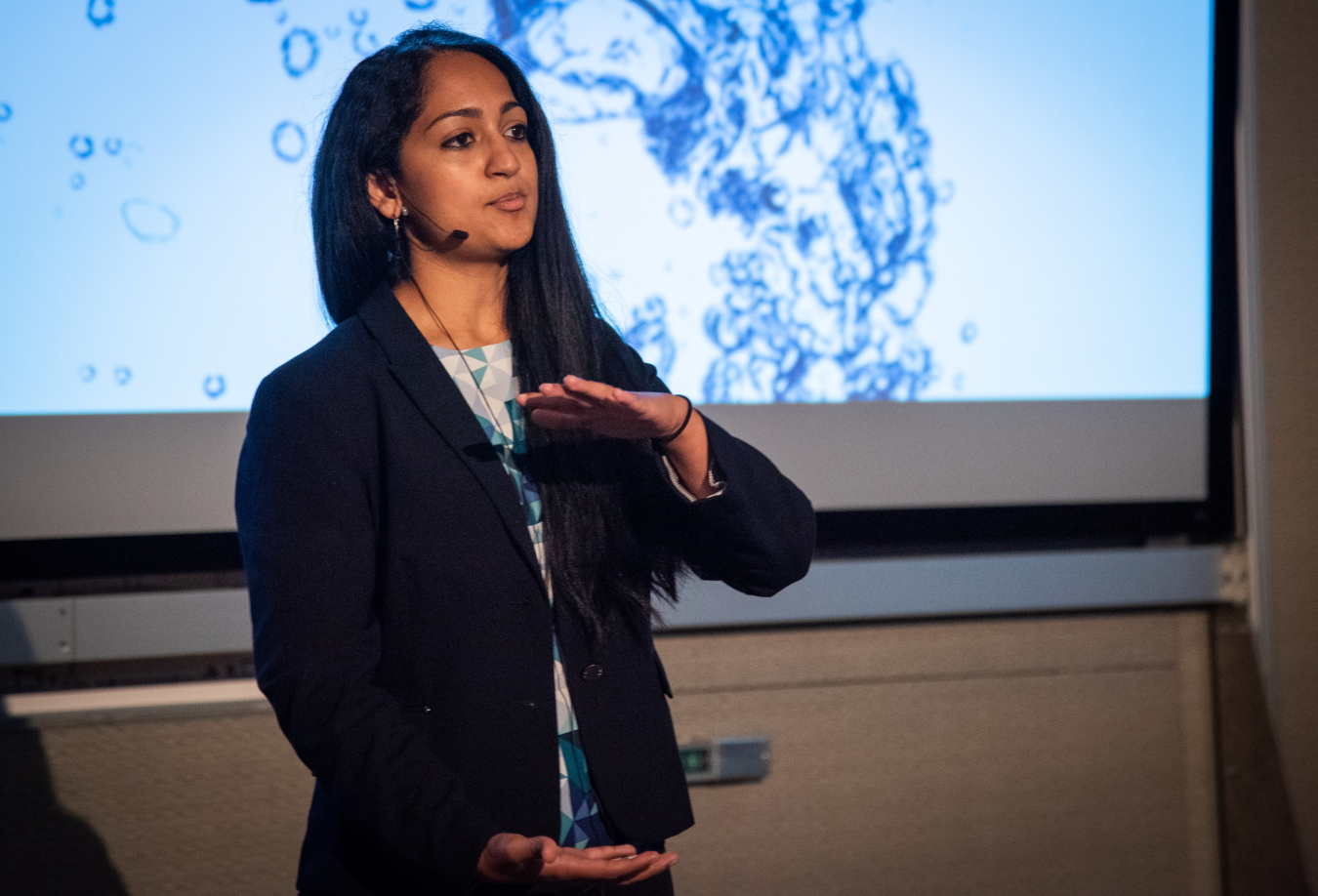Learn why Dr. Akanksha Menon loves her job as a ITRI-Rosenfeld Postdoctoral Fellow & thermal scientist in the Energy Technologies Area at Berkeley Lab
March 11, 2021
Dr. Akanksha Menon is an ITRI-Rosenfeld Postdoctoral Fellow and thermal scientist in the Energy Technologies Area at Lawrence Berkeley National Laboratory (Berkeley Lab). Akanksha joined the Thermal Energy Group in 2018 to perform research at the water-energy nexus, and her current projects include transforming wastewater into clean water by harnessing solar energy and decarbonizing heat using composite materials for thermal energy storage. Akanksha obtained her Ph.D. in Mechanical Engineering from Georgia Tech, where she developed polymer-based thermoelectrics that harvest thermal energy for wearable electronics and functional textiles. Akanksha is a recipient of the 2019 Sigma Xi Dissertation Award and the 2017 MRS (Materials Research Society) Graduate Student Silver Award. She co-founded the Water Wednesday’s initiative at Berkeley Lab and served as the Co-President of the Energy Club @ Georgia Tech.
What inspired you to work in STEM?
Like many others, I enjoyed math and science classes in school, which set me on a STEM career path. Growing up, I was fascinated by the universe and dreamed of being an astronaut at NASA. When I was in high school, my uncle gifted me a book that deeply resonated with me called Storms of my Grandchildren: The Truth About the Coming Climate Catastrophe, by renowned scientist James Hansen. That is when I knew that I wanted to work on something closer to “home”, toward developing new energy solutions to address and/or mitigate the climate crisis. I chose mechanical engineering as this gave me an opportunity to learn thermodynamics and heat transfer that underpin every energy conversion process. There’s been no looking back ever since, as over the past decade I have had the opportunity to work on exciting problems ranging from wastewater treatment and thermal energy harvesting, to storing energy as heat and producing clean hydrogen. Another reason I was inspired to work in STEM was because I realized there were very few women role models in my field. Rather than allowing this to deter me, I saw this as an opportunity to one day become that role model for someone else.
What excites you about your work at the Energy Department?
I was keen on doing my postdoc at a DOE national lab because of the emphasis on team science – working together to develop scientific solutions to the world’s most pressing issues. What excites me most about my work at Berkeley Lab is the potential impact of the water treatment or desalination technologies that we’re developing that use solar energy. I get to collaborate with a team of brilliant scientists with different expertise which ensures that I’m always learning, and we work with industry partners who help define real-world problems to focus our research on. There’s also the added bonus of having access to world-class DOE user facilities like the Molecular Foundry and the Advanced Light Source to understand the underlying physics of the materials we work with. Berkeley Lab’s proximity to UC Berkeley is great too, because this has enabled me to mentor both undergraduate and Ph.D. students, which I am very passionate about.
How can our country engage more women, girls, and other underrepresented groups in STEM?
There are a few different approaches - better representation and more women role models in STEM, breaking stereotypes, and creating awareness about existing opportunities. This Women @ Energy initiative is a perfect example of helping get the word out about underrepresented groups in STEM. Other DOE initiatives like the C3E Symposium, which I have now attended three times, can also help motivate students to work in STEM by getting exposure to so many role models. As an early-career researcher, I was so excited to see a ballroom full of accomplished entrepreneurs, professors, politicians working in clean energy that were all women! I also fondly remember an ad that General Electric developed for the 2017 Oscars, which imagined a world in which scientists were treated like celebrities. Providing new perspectives like this can help improve the STEM pipeline in the country.
Community outreach events are another avenue to engage more underrepresented groups - Berkeley Lab has a dedicated K-12 STEM Education and Outreach Program where we perform simple hands-on science experiments to get young minds curious and excited. I’m also a proponent of science communication or technology pitch events, where you explain your research and its impact in general terms that can be understood by a broad audience. This is important because no one outside our research community really reads journal papers, so we have to make the information more accessible. Engaging in such activities will also help shatter stereotypes – there really is so much more to engineering and STEM and we have to do a better job of communicating that.
Do you have tips you'd recommend for someone looking to enter your field of work?
I’d encourage anyone to pursue a career in energy or sustainability if they’re passionate about it and are willing to work hard. Good grades are important, but I think it is more important to get comfortable with finding solutions to open-ended problems and thriving in an unstructured environment. As long as you have the right attitude and are persistent, you can succeed in STEM. It is also important to find a supportive community (family, friends, peers and mentors) that will encourage you to keep learning and growing
When you have free time, what are your hobbies?
I read a lot, but recently I’ve been listening to more podcasts. I’m learning to play the ukulele and I’ve always enjoyed singing (I have trained in Indian classical music). I also love hiking and being outdoors, so I’m making the most of the mild Bay Area winters!
Learn more about our programs & resources for women and girls in STEM at http://www.energy.gov/women

